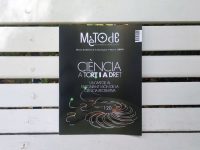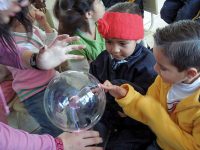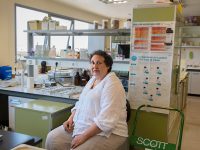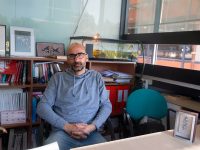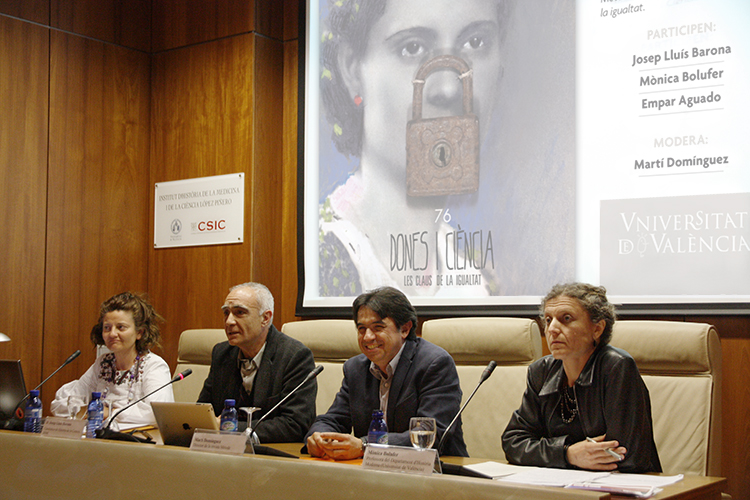
 © Anna Mateu |
||
|
Last April 30, the López Piñero Institute for the History of Medicine and Science, held the launching event of Mètode’s issue 76, entitled Women and Science. Keys to Equality. The event had many attendees that filled the conference hall at Palau de Cerveró, who were both scientists and regular readers of the journal. This is the first of a series of conferences organised by Mètode and the López Piñero Institute for the History of Medicine and Science with the aim of spreading the contents of the journal. The eternal issue Ever since the times of the Greek philosopher Hypatia until nowadays, not forgetting Émilie du Châtelet, great mathematician of the 18th century, the psychoanalyst Anna Freud, Beatrice Edgell, or Dorothy Nelkin, women have stood out in the science world, but with more sacrifice and to a lesser extent than men. But why is this so? What is stopping them from developing their ideas and getting the recognition they deserve from the scientific community? According to Mètode’s Editor-in-Chief, Martí Domínguez, inequality between sexes is “the eternal issue”: society has been adopting a patriarchal hierarchy for centuries, which has resulted in the unequal distribution of the household chores and the education of children, fact that has kept women away from research and scientific development. Women have had to choose between raising a family or studying a degree, doing both was incompatible. |
|
|
 © Anna Mateu |
«Eve in Catholicism and Pandora in Greek mythology, were the first women to question the status quo: the first ones who were curious enough, the first ones to start research» |
|
|
towards the feminisation of science «I agreed to lead the monograph because I think we live in a somehow blind society, a self-satisfied society». These words opened Josep Lluís Barona’s discourse, who is full professor of Science History at the University of Valencia and co-ordinator of the journal’s latest issue. According to the professor, «democracy is something more than just equality». As he states, patriarchal society has kept women away from the research environment for many years. Until we solve the gender issue, he said, we will not live in a full democracy. In addition, he added: «Science will not be democratic until it becomes completely public and feminised». Eve in Catholicism and Pandora in Greek mythology, were the first women to question the status quo: the first ones who were curious enough, the first ones to start research. «Science is feminine in our collective imagination», pointed out Josep Lluís Barona. Curiosity, according to the professor, is the basis of science and knowledge. All in all, women have been characterised as inferior to men. |
||
|
total motherhood After Josep Lluís Barona, it was Mónica Bolufer’s turn, professor at the Department of Sociology and Social Antropology at the University of Valencia, and an expert in 18th century France. According to the historian, the origins of the current models of masculinity and femininity can be found in the 18th century. Politic, moral and religious discourses of the time placed women back in the house. Bolufer introduced the concept of «total motherhood», a term that refers to women’s exclusive dedication to their children. In the 18th century, a series of scientific texts helped to spread the false belief that children had to be looked after only by their mothers —and not by nursemaids or women close to the family, which was a common practice until that moment—. From this moment on, people thought that «women’s destiny, mission and vocation were their children», according the historian. |
||
 © Anna Mateu |
«The concept of “total motherhood” refers to women’s alleged devotion to look after their children» |
|
|
an improvement in percentages is needed Finally, it was Empar Aguado’s turn, professor from the Department of Sociology and Social Anthropology of the University of Valencia, who described the current situation of the scientific world from the point of view of sociology. According to the sociologist, nowadays there is still a low percentage of women taking doctorate courses in contrast with the high numbers men that defend their doctoral thesis. This is a huge contradiction, taking into account that most undergraduate students in Valencian universities are women. Empar Aguado also stated the differences in undergraduate studies: degrees related to Humanities and Social Sciences are still considered as feminine, while a very low percentage of women start studies related to science or engineering. Eva Maria Javier. Student of Journalism from the Universty of Valencia. |
|
|


